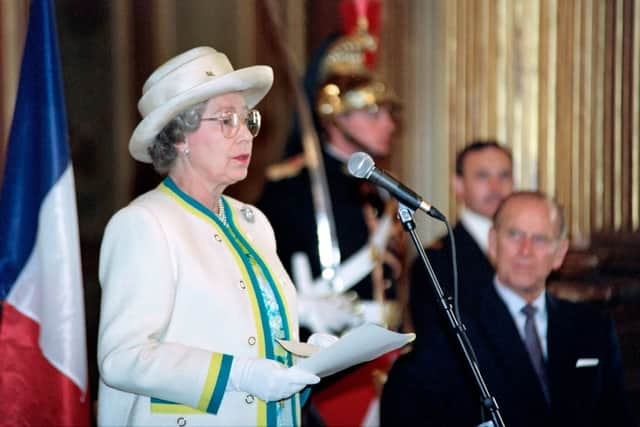Annus horribilis meaning: what did the Queen say in 1992 speech, what happened - including Windsor Castle fire
and live on Freeview channel 276
1992. Possibly the lowest moment of the Queen’s 70-year reign, a year of royal scandal and turmoil that the Queen nicknamed her "annus horribilis."
As the events depicted in Netflix’s The Crown edge ever closer to the modern day, Season 5 of the hit show covers most of the events which led to the Queen labelling her 1992 as such.
Advertisement
Hide AdAdvertisement
Hide AdBut what is an ‘annus horribilis’? What does the phrase mean, and why did the Queen use it to describe a certain period of her life?
Here is everything you need to know about it.
What does ‘annus horribilis’ mean?
Quite simply, ‘annus horribilis’ is a Latin phrase that translates as ‘horrible year’.
It is thought the phrase was first used in 1891 to describe 1870, the year in which the concept of papal infallibility - the idea that the Pope, when speaking “ex cathedra” or giving official statements teaching about faith and morals, is preserved from the possibility of error on doctrine - was introduced in the Roman Catholic Church.
But 101 years later, Queen Elizabeth brought the phrase to modern prominence, when she included it in a 1992 speech marking her Ruby Jubilee on the throne.
Advertisement
Hide AdAdvertisement
Hide Ad

“1992 is not a year on which I shall look back with undiluted pleasure,” she said. “In the words of one of my more sympathetic correspondents, it has turned out to be an annus horribilis.”
Acknowledging that the monarchy should not be above criticism, the Queen effectively pleaded for a fairer hearing from press and public with a pledge to work for change while maintaining the institution’s stability and continuity at the end of a period of unrelenting scrutiny of the royal family’s affairs – from the marriage problems of the Waleses to the break-up of the Yorks.
The Queen’s use of the Latin phrase “annus horribilis” was a play on the more commonly used phrase “annus mirabilis”, meaning “year of wonders”.
What happened in 1992?
1992 was when the Prince and Princess of Wales were at war, the Duke and Duchess of York separated, Princess Anne divorced, Windsor Castle went up in flames, and public opinion turned against the royals.
The events that dogged the monarchy that year included:
Advertisement
Hide AdAdvertisement
Hide Ad- The publication of images relating to Sarah, Duchess of York’s affair with Texan oil millionaire Steve Wyatt
- The separation of the Queen’s second son Prince Andrew, Duke of York, from his wife Sarah
- The divorce of the Queen’s daughter, Anne, Princess Royal, from Captain Mark Phillips
- The publication of Diana, Princess of Wales’ autobiography Diana: Her True Story, which revealed the difficulties in her marriage to Charles, Prince of Wales, particularly his affair with Camilla Parker Bowles
- The publication of photographs of Sarah, Duchess of York, sunbathing topless with her friend John Bryan
- Diana and James Gilbey’s private phone conversations being made public via a tape recording of their phone calls
- The fire in Windsor Castle, one of the Queen’s official residences
Following the Queen’s Guildhall speech in November 1992, another notable event occurred: Charles and Diana’s separation.
What did the Queen say?
Her voice cracking through the effects of a cold, the Queen used what should have been a happy celebration to face down her critics and thank her supporters for their loyalty during her Guildhall speech.
Acknowledging that the monarchy should not be above criticism, the Queen effectively pleaded for a fairer hearing from press and public with a pledge to work for change while maintaining the institution’s stability and continuity.
“There can be no doubt, of course, that criticism is good for people and institutions that are part of public life,” she said.
Advertisement
Hide AdAdvertisement
Hide Ad“No institution, city, monarchy, whatever, should expect to be free from the scrutiny of those who give it their loyalty and support, not to mention those who don’t.
“But we are all part of the same fabric of our national society and that scrutiny, by one part of another, can be just as effective if it is made with a touch of gentleness, good humour and understanding.”
